THE SOCIAL CONTRACT THEORY IN THE VISION OF JEAN-JACQUES ROUSSEAU
DOI:
https://doi.org/10.24193/subbphil.2018.spiss.02Keywords:
social contract; state of nature; man in society; sovereign; general will; common goodAbstract
The Social Contract Theory in the Vision of Jean-Jacques Rousseau. Man is not social by nature, becoming social only under the influence of society. In the state of nature, man is solitary, autonomous, his own master. His only worry is to preserve his own life, to assure his necessities of living. With the formation of the first social groups (family), man no longer lives alone, starts to build a roof over his head, to assume certain responsibilities, to enter into communication with those around him, perfecting his language and improving his way of life. With such progress, selfesteem is born, pride, the need to be recognized by others as being superior. Differences in status tear apart the previous equality and lead to conflicts between individuals. Each desires what the other desires to have, not for the sake of that good's intrinsic value, but only because the other desires it. Therefore, in order to assure their own safety, as well as that of their property, men will form a covenant – the social contract.
References
Aristotle, Politics, Benjamin Jowett translation, Oxford: Clarendon Press, 1926. 1252b8-9.
Avramescu, C., De la teologia puterii absolute la fizica socială, București, 1998.
Fley, A., Dicționar de filozofie și logică. București: Editura Humanitas, 2006.
Foisneau, L., “Governing a Republic: Rousseau’s General Will and the Problem of Government”. În Republic of Letters: A jurnal of study of knowledge, Politics and the Arts 2, no. 1/2008.
Geledan, A., Godfroy, V., et al., Dicționar de idei politice. Iași: Editura Institutul European., 2007.
Grunberg, L., “Jean Jacques Rousseau și Filozofia”. In Revista Română de Filozofie, no. 5/1978, vol. 25, pp. 625‒631.
Iliescu, A. P., Fundamentele gândirii politice moderne. Iași: Editura Polirom, 1999.
Manent, P., Originile politicii moderne: Machiavelli/ Hobbes/ Rousseau: București: Editura Nemira, 2000.
Miller, D., Enciclopedia Blackwell a gândirii politice. București: Editura Humanitas, 2006.
Nay, O., Istoria ideilor politice. Iași: Editura Polirom, 2008.
Rădulescu, M., Papu, E., et al., Istoria filozofiei moderne de la Renaștere până la Kant. București: Editura Tess-Express, 1996.
Rousseau, J. J., Discurs asupra originii și fundamentelor inegalității dintre oameni. București: Editura Științifică, 1958.
Rousseau, J. J., Contractul social. București: Editura Nemira, 2008.
Riley, P., The Cambridge Companion to Rousseau. UK: Editura Cambridge University Press, 2001.
Roșca, I., “Filozofia socială, politică și juridică la Jean Jacques Rousseau”. In Revista Română de Filozofie, no. 5-6/1991, vol. 38, pp.331‒338.
Scalat, Ș. L., Dicționar de scrieri politice fundamentale. București: Editura Humanitas 2000.
Șerban, L., “Înstrăinarea în concepția gânditorilor contractualiști: H. Grotius, Th. Hobbes și J. J. Rousseau”. In Revista Română de Filozofie, no. 4/1975, vol. 22, pp. 503‒507.
Downloads
Published
How to Cite
Issue
Section
License
Copyright (c) 2018 Studia Universitatis Babeș-Bolyai Philosophia

This work is licensed under a Creative Commons Attribution-NonCommercial-NoDerivatives 4.0 International License.





